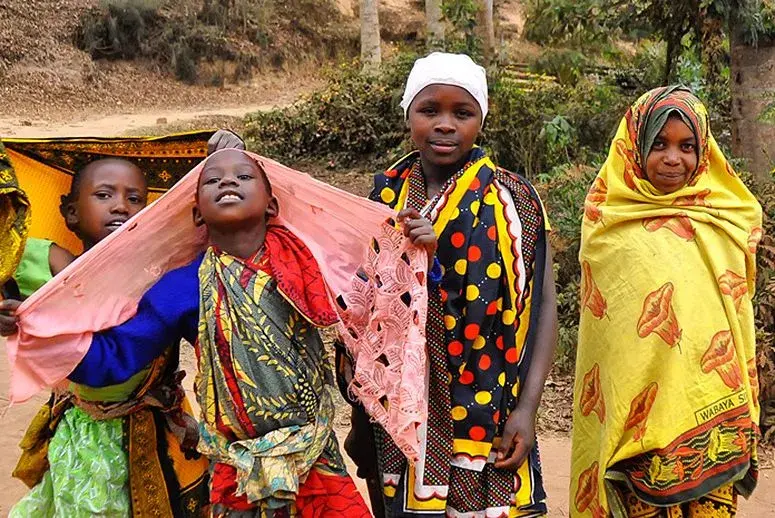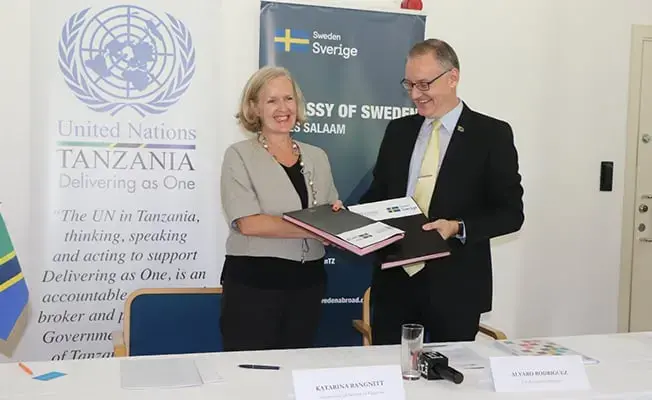C- Sema – Kiswahili for speak – runs the National Child Helpline #116 – a toll-free service that is available across all networks in Tanzania mainland and Zanzibar. The service is a lifeline for children who are suffering from or vulnerable to violence and abuse – as well as family and community members who call the helpline to report children at risk.
C-Sema liaises closely with gender-based violence (GBV) prevention and response services, including social welfare officers and the police gender and children’s desks, linking callers with support networks and protection systems in their locality.
Keeping the service running
When the pandemic reached Tanzania in early March, C-Sema had one objective: to ensure that in the challenging times of COVID-19 the Helpline would remain up and running and that there would always be a voice at the end of the line.
Gender-based violence (GBV) and harmful practices, including female genital mutilation and child marriage, remain a serious problem in Tanzania – in spite of government commitment – and although Tanzania did not enforce the stringent lockdown of its neighbours, measures imposed to keep young women and girls safer from COVID-19, such as school closures, had the potential to make them more vulnerable to violence.
“Throughout March and April we were getting an increased number of calls from young people”, says Michael Marwa, Director of the National Child Helpline. “At the same time services on the ground, including GBV prevention and response, were becoming scarcer. We needed more staff with specific skills to support and counsel callers.”
“Throughout March and April we were getting an increased number of calls from young people”, says Michael Marwa, Director of the National Child Helpline. “At the same time services on the ground, including GBV prevention and response, were becoming scarcer. We needed more staff with specific skills to support and counsel callers.”
Providing essential support to callers
An additional nine counsellors were recruited to the helpline to deal with the increased demand for the service and to provide the expertise needed – supported by UNFPA. The recruited counsellors and all call operators attended online psychosocial support training so that they could counsel callers on their mental and emotional well-being and signpost them to protection services. The training also covered emergency preparedness, COVID-19 and the potential impact of the pandemic on GBV prevalence – all facilitated by a UNFPA consultant. Staff and counsellors were also provided with masks and sanitizer. IT equipment and support for the development of interactive voice responses (IVR) on sexual and reproductive health and reproductive rights further bolstered the capacity of the helpline to ensure that it never stopped operating.
The importance of accurate information
As misinformation about COVID-19 swirled, and with more young people now at home and unable to access sexual and reproductive health services, including GBV prevention and response, C-Sema launched the chatbot #Malezi – or parenting – on WhatsApp for young people in Zanzibar – again with UNFPA’s support.
“#Malezi means young people have instant access to age-appropriate sexual and reproductive health and COVID-19 information as well as a list of numbers they can call if they are being abused,” says Marwa, “Accurate and timely information is needed now more than ever.” The bot is also tracking trends so that UNFPA and C-Sema can more fully understand the challenges that young people face in Zanzibar as well as what they want to know.
Delivering smarter
The COVID-19 pandemic has caused devastation around the world, highlighting inequalities and disparities; it has also challenged traditional modes of service delivery. But with partners such as C-Sema we have adapted, and will continue to adapt, to maintain access to life-saving services for some of the most marginalized young women and girls.
As Tanzania makes the slow return to a new normal our focus is to build on what we have learned and maintain momentum towards realizing UNFPA and the international community’s global goals by the end of the decade – a Tanzania and world where young person, especially adolescent girls, have a brighter future, one where they live free from harm, control their destiny and realize their potential.
For more information on the National Child Helpline visit: https://sematanzania.org/child-helpline
1. The National Child Helpline provides support, advice and information to young people under the age of 18.
2. C-Sema runs the National Helpline in collaboration with the Governments of Tanzania and Zanzibar.
3. UNFPA’s support to C-Sema is funded by the Government of Canada.




